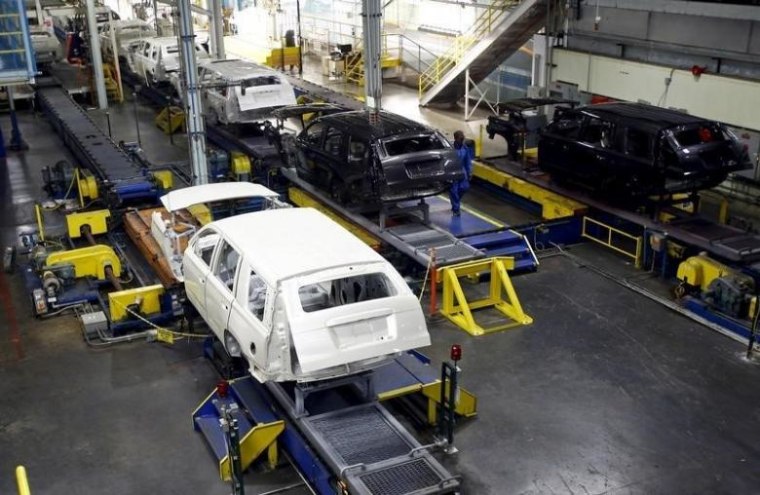Despite other signs of a relatively healthy economy, things are starting to get worrisome in the auto industry where manufacturers have been scheduling production cuts faster than at any time since the Great Recession.
General Motors, which had already dropped shifts at five plants since last autumn, now says it will eliminate a shift at the Fairfax, Kansas plant building its once-popular Chevrolet Malibu. The automaker’s Canadian operations, meanwhile, will extend the originally scheduled summer shutdown at two plants due to bulging inventories on both sides of the border.

GM isn’t alone. Ford laid off thousands of workers due to temporary shutdowns in May, and Fiat Chrysler Automobiles has one entire factory idled.
Automakers are trying to avoid the trap they fell into during the run-up to the last industry downturn. GM CEO Mary Barra, for one, has promised to keep production in line with demand, rather than try to prop up sales through profit-gobbling incentives, even if that means closing plants.
The elimination of the third shift at Fairfax could translate into the loss of 1,000 workers, though GM said it didn’t have a final figure available yet. The Malibu plant will also see its normal two-week summer shutdown extended to five weeks.
Related: Slowing Auto Industry Threatening to Drag Down the U.S. Economy
The downturn reflects several factors, noted analyst Joe Phillippi, of Autofacts Consulting. The Malibu, for example, has fallen victim to the dramatic shift from sedans and other passenger vehicles to SUVs, crossovers and pickups. Light trucks, on the whole, now account for nearly two-thirds of total new vehicle sales in the U.S., a figure some believe could still rise another 5 percentage points before leveling off.
Despite strong reviews, the Chevy Malibu’s sales have tumbled by about 30 percent since the beginning of the year, a trend repeated among most of the Detroit sedan’s midsize competitors.
FCA responded to that by ending production of passenger car models in the U.S. Two plants in Illinois and Michigan are in the midst of year-long shutdowns as they are converted to build light trucks, such as the next-generation Ram pickup.
Ford, meanwhile, is ending U.S. production of small cars, such as the Focus sedan. That model has been rolling off the line at a plant in Wayne, Michigan that will soon be converted to build a new Bronco SUV and a new midsize Ranger pickup.
Ford originally planned to move production of the Focus to a new plant in Mexico. It scrapped that factory in January and announced Focus would move into an existing facility in Hermosillo. But, just this week, the automaker said it would now start importing the Focus from China, making it the first major product line imported from that Asian nation.
Related: How the Big Three Are Adapting to a Rapidly Changing Global Auto Market
At the same time, automakers are facing an overall downturn in the U.S. automotive market after an unusually long recovery that saw sales set three consecutive annual records.
The monthly declines have so far been running in the low single digits since the beginning of the year — May off 2 percent — but there is fear things could get worse. While IHS Automotive has been holding to a relatively benign forecast that overall U.S. new vehicle demand will slip about 100,000 units from last year’s record 17.55 million, the consultancy is said to be reviewing its projections. Several other research firms have already downgraded their estimates to numbers closer to 17 million.
That could spell trouble for President Donald Trump, who has been spotlighting manufacturing jobs since he began his campaign for the White House and automotive jobs, in particular. On the positive side, several makers have announced modest plans to bring back jobs from overseas, and Ford, for one, just announced a $900 million investment in a Kentucky truck plant. But even those announcements aren’t moving the needle much.
When Barack Obama moved into the White House he inherited an auto industry hitting a low point not seen in decades. But between the jobs created and the rush of cash pumped into the economy, the industry was a key force in the economic recovery.
According to data analyzed by the Brookings Institute, automakers and suppliers were responsible for just 2 percent of the 45,000 manufacturing jobs created in the U.S. during the first quarter of this year.
By shifting resources from cars to light trucks, automakers hope to keep consumers spending and buoy sales. Industry officials also insist that they can handily weather a dip that still keeps sales in the 17 million range. That’s a far cry from the sub-10 million low point hit during the last recession.
Nonetheless, with the auto industry struggling to maintain momentum, any other hit could prove doubly difficult for the economy to take, analysts warn. And auto sales are particularly sensitive to any weakening of the economy, so declines in housing, for example, could lead to an escalating, downward spiral. And that would send even more autoworkers lining up at the unemployment office.
